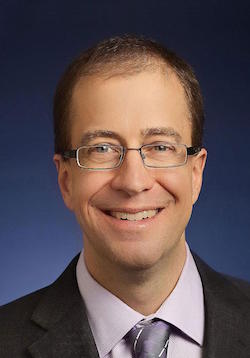 When former director of health innovation and policy at Intel and cancer survivor Eric Dishman took over the NIH’s ambitious program to collect a deep research dataset on a diverse population of a million Americans, it was called the NIH Precision Medicine Initiative Cohort Program. These days the program is no less ambitious, but it has a much friendlier name: the All of Us Research Program.
When former director of health innovation and policy at Intel and cancer survivor Eric Dishman took over the NIH’s ambitious program to collect a deep research dataset on a diverse population of a million Americans, it was called the NIH Precision Medicine Initiative Cohort Program. These days the program is no less ambitious, but it has a much friendlier name: the All of Us Research Program.
“Given how participant-centered we’re being, some of these folks don’t know what a cohort is … so we changed the name,” Dishman said in the opening keynote of the HIMSS Precision Medicine Summit in Boston today. “This wasn’t for the researchers, this was for the participants that we need to reach who have never been involved in biomedical research before.”
That's part of an emphasis on making participants partners in the project. There are also participant representatives on the program's advisory board.
All of Us isn’t just a longitudinal research study. It’s a forward-looking project meant to establish a dataset that can be used by all kinds of researchers for years to come and a research infrastructure that will endure beyond the project.
“Our taxpayer dollars are being used to build the free resource,” he said. “We are not funding the science except for some pilots we’ll fund to make sure our systems are working for different kinds of scientific questions. That will come from the rest of the NIH and foundations and companies that want to use this large resource that would be very difficult for them to create for themselves.”
Of particular interest to MobiHealthNews readers, Dishman talked a little bit about the role of wearables in the program. Apps and wearables aren’t rolled out in the pilot group but will be added before too long, he said.
“There’s lots of small-scale studies looking at consumer wearables and finding interesting things, but nothing that’s scaled out enough to be able to say ‘These work great for clinical research, these don’t,” he said. “…We want to and will do mHealth and personal health technologies. We’ll initially start with what people already have, but I think at some point we may have to get the industry to create something for us that would be an All of Us unique device. But I think that’s several years down the road for us.”
The project is also aiming to truly capture the diversity of the United States, a goal that Dishman says is important for the integrity of the research.
“We really need to reach those underrepresented in biomedical research,” he said. “People say ‘You’re just being politically correct’. I say no, I’m being scientifically correct. This is what one does when doing a scientific study.”
NIH has launched a website for the project, joinallofus.org. Come October or November, anyone should be able to go to that website and sign up to be part of the cohort. Right now they’re in a controlled beta phase with 10 to 15 thousand participants. This is to give the study location some time to work out logistical kinks before the floodgates are opened, Dishman said.
The project is not without challenges. For instance, the NIH is committed to giving people back their data, but that’s not always easy to do.
“Right now I don’t have enough genetic counselors in the country to be able to properly, responsibly get that information to people in the study,” he said. “That’s one of the big workforce problems we have.”
Another concern is that, as the NIH collects so much data from people, it will become a target for hackers.
“Certainly privacy and trust is huge for us and we developed a set of principles with industry, with the website, with cybersecurity groups at the White House,” he said. “We will be a huge target, and it’s one of the things I lose sleep about, but we’ve taken all the steps we can. And everything’s been tested and thoroughly vetted.”
One thing that’s low on Dishman’s list of concerns is the Trump budget. He said that indicators like the retention of Francis Collins as head of the NIH and the bipartisan congressional support for the 21st Century Cures Act suggest that funding for the project is relatively safe.
Just as the All of Us project got rid of the word ‘cohort’ from its name, Dishman hopes the project will lead us down a road that eliminates ‘cohort’ from our vocabulary entirely. NIH wants to show the way to universal sharing of de-identified data that contributes to a learning health system, with every patient’s care supported by all the data in the world.
“The prototype aspect of our program is really about ending the notion of cohorts as we know them today,” he said. “How do we get to the era of a universal cohort, with no silos and no cohorts?”
















